|
|
|
Sort Order |
|
|
|
Items / Page
|
|
|
|
|
|
|
| Srl | Item |
| 1 |
ID:
138777
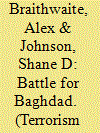

|
|
|
|
|
| Summary/Abstract |
The Iraqi Insurgency (2003–2011) has commonly been characterized as demonstrating the tendency for violence to cluster and diffuse at the local level. Recent research has demonstrated that insurgent attacks in Iraq cluster in time and space in a manner similar to that observed for the spread of a disease. The current study employs a variety of approaches common to the scientific study of criminal activities to advance our understanding of the correlates of observed patterns of the incidence and contagion of insurgent attacks. We hypothesize that the precise patterns will vary from one place to another, but that more attacks will occur in areas that are heavily populated, where coalition forces are active, and along road networks. To test these hypotheses, we use a fishnet to build a geographical model of Baghdad that disaggregates the city into more than 3000 grid cell locations. A number of logistic regression models with spatial and temporal lags are employed to explore patterns of local escalation and diffusion. These models demonstrate the validity of arguments under each of three models but suggest, overall, that risk heterogeneity arguments provide the most compelling and consistent account of the location of insurgency. In particular, the results demonstrate that violence is most likely at locations with greater population levels, higher density of roads, and military garrisons.
|
|
|
|
|
|
|
|
|
|
|
|
|
|
|
|
| 2 |
ID:
161594
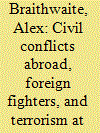

|
|
|
|
|
| Summary/Abstract |
Terrorist attacks in Brussels (May 2014) and Paris (January and November 2015) highlight the threat related to the arrival of foreign fighters (FFs) from civil wars elsewhere. We develop an argument suggesting that terrorism at home is systematically affected by the exit of the so-called FFs out of civil wars abroad. We contend that foreign civil conflicts ending in success for rebel groups can result in a surplus of well-trained FFs, increasing the risk of terrorism at home. By contrast, when rebel groups are defeated in foreign civil conflicts, we anticipate a restriction in the flow of FFs, which reduces the likelihood of terrorism at home. Empirical analyses on most countries for the years 1970 to 2006 support these hypotheses. Our tests also demonstrate that the flow of FFs is associated with the creation of new terrorism campaigns rather than the exacerbation of existing operations.
|
|
|
|
|
|
|
|
|
|
|
|
|
|
|
|
| 3 |
ID:
142038


|
|
|
|
|
| Summary/Abstract |
Violent domestic conflicts spread between countries via spillover effects and the desire to emulate events abroad. Herein, we extend this emulation logic to the potential for the contagion of nonviolent conflicts. The spread of predominantly nonviolent pro-democracy mobilizations across the globe in the mid-to-late 1980s, the wave of protests in former Soviet states during the Color revolutions in the 2000s, and the eruption of nonviolent movements across the Middle East and North Africa during the Arab Spring in the early 2010s each suggest that the observation of collective action abroad encourages a desire to emulate among potential challengers to domestic autocrats. However, the need to emulate varies. Potential challengers with a recent history of protest at home are less dependent (than are those without similar experience) upon foreign exemplars to mobilize the participants and generate the resources required to make emulation practicable. By contrast, where the domestic experience of protest is absent, opposition movements are more reliant upon emulation of foreign exemplars. We test the implications of this logic using a series of multivariate logistic regression analyses. Our tests employ data on nonviolent civil resistance mobilizations that occurred across the global population of autocratic states between 1946 and 2006. These tests, along with post-estimation analysis, provide evidence consistent with our conditional logic of emulation.
|
|
|
|
|
|
|
|
|
|
|
|
|
|
|
|
| 4 |
ID:
134516
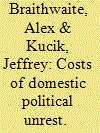

|
|
|
|
|
| Summary/Abstract |
Does domestic political unrest deter foreign direct investment (FDI)? And what are the longer term impacts of unrest upon the market? Most theories suggest that investors are deterred by unrest. However, empirical research returns only marginal support. We argue that these mixed results stem from the conflation of the distinct tactics and outcomes of political unrest. Violent forms of unrest increase uncertainty and risk. By comparison, nonviolent forms of unrest are shown to more frequently achieve their goals and increase the prospects for democratic change and market stability. In addition, investors avoid markets where campaigns have ended in failure, defined as the campaign not achieving their stated political aims. Failed campaigns often precipitate a cycle of unrest that create greater uncertainty over the long-term stability of a state. We find strong evidence in favor of our propositions, even after taking political motivation and non-random selection into account.
|
|
|
|
|
|
|
|
|
|
|
|
|
|
|
|
| 5 |
ID:
162772
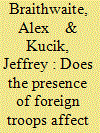

|
|
|
|
|
| Summary/Abstract |
Troops were deployed on an unprecedented scale during the Cold War. Much of the network of deployments established during that time has persisted long after the end of the Cold War. We look to contribute to a growing literature addressing the costs and benefits associated with hosting foreign troops. We ask: Does the presence of foreign troops affect stability in the host country? To answer this question, we develop an argument in which deployed troops are seen as a costly signal of the deploying state’s interest in and commitment to stability in the host country. The presence of foreign troops positively affects the perceived stability of the host country and the robustness of their legal and political institutions. This bolsters the enforcement of agreements between the host government and latent and manifest opposition groups to pursue alternatives to fighting. We test this logic using instrumental variables regressions in which we endogenize deployment motivations. All tests support the expectation that the presence of foreign troops reduces the likelihood of the occurrence of civil conflict in the host state.
|
| Contents |
Troops were deployed on an unprecedented scale during the Cold War. Much of the network of deployments established during that time has persisted long after the end of the Cold War. We look to contribute to a growing literature addressing the costs and benefits associated with hosting foreign troops. We ask: Does the presence of foreign troops affect stability in the host country? To answer this question, we develop an argument in which deployed troops are seen as a costly signal of the deploying state’s interest in and commitment to stability in the host country. The presence of foreign troops positively affects the perceived stability of the host country and the robustness of their legal and political institutions. This bolsters the enforcement of agreements between the host government and latent and manifest opposition groups to pursue alternatives to fighting. We test this logic using instrumental variables regressions in which we endogenize deployment motivations. All tests support the expectation that the presence of foreign troops reduces the likelihood of the occurrence of civil conflict in the host state.
|
|
|
|
|
|
|
|
|
|
|
|
|
|
|
|
| 6 |
ID:
160473


|
|
|
|
|
| Summary/Abstract |
This article introduces a special issue of Journal of Global Security Studies on advances in the disaggregated study of actors and tactics in nonviolent civil resistance campaigns. We initially discuss the recent rise of empirical, primarily quantitative research on nonviolence and civil resistance. We then note that the latest innovations in this literature are providing a disaggregated perspective on the actors engaging in nonviolence, as well as the tactics that they employ in doing so. In many respects, this direction parallels that taken in the study of civil wars over the past two decades. At the heart of this evolution in the research agenda on nonviolence is the availability of new, more nuanced data. The five articles in this issue very neatly demonstrate best practices in asking compelling research questions, deriving nontrivial hypotheses, and providing new data on the disaggregated nature of campaigns of nonviolent resistance.
|
|
|
|
|
|
|
|
|
|
|
|
|
|
|
|
| 7 |
ID:
124109


|
|
|
|
|
| Publication |
2013.
|
| Summary/Abstract |
A rich literature addresses how a state's capabilities, its desire to aid or exploit a warring neighbor, and its alliance commitments determine whether or not the state joins an ongoing conflict. However, an important geopolitical consideration - proximity to the location of the ongoing conflict - has yet to be examined. The authors argue that states are more likely to join conflicts that occur close to their territories than conflicts that are located at a greater distance, and that accounts that do not pay attention to this distance are incomplete. Proximity to the location of an ongoing conflict affects the opportunity for a state to join (by decreasing costs), while also affecting the state's willingness to join (by increasing the potential threat to the state's security). A series of statistical models provide evidence for the authors' claims: a state's opportunity to join and its willingness to aid or exploit a neighbor in conflict, or to fulfill its alliance commitments, are each conditioned by its proximity to the location of the conflict. This conditioning effect of dispute location is important because it helps account for cases that appear to contradict the expectations of existing arguments regarding capabilities, contiguity, and alliances - such as when weak, non-contiguous, and non-allied states join ongoing conflicts and strong, contiguous, and allied states do not join.
|
|
|
|
|
|
|
|
|
|
|
|
|
|
|
|
| 8 |
ID:
073577
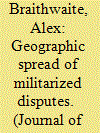

|
|
|
|
|
| Publication |
2006.
|
| Summary/Abstract |
A thriving literature investigates the claim that geographic processes cause military conflict to cluster and diffuse. With the recent update of the Militarized Interstate Dispute (MID) data and the collection of geographic locations to accompany these data, it is now possible to offer a location-based examination of the geographic spread of conflict. Consideration of the literature that identifies a role for physical geography in conflict processes leads to the derivation of hypotheses in which territory and resources are expected to provide incentives for states to seek to increase territorial acquisitions, while impassable terrain is expected to act as a barrier to such spread. These hypotheses are tested using ordinary least squares (OLS) estimation - regressing the spread of individual MIDs in the years 1993-2001 upon a range of location- and dispute-specific variables. These regressions demonstrate that the spread of individual disputes is a function of the issue over which they are fought, the presence of vital resources in the host country, the prevailing terrain of that country, and the relevant conflict history of the participants. It is argued that knowledge of the precipitants of the spread of individual conflicts is of great benefit to policymakers seeking to mitigate the detrimental impact of conflict upon the societies in which it occurs, as well as to those deploying peacekeeping troops to conflict zones.
|
|
|
|
|
|
|
|
|
|
|
|
|
|
|
|
| 9 |
ID:
186650
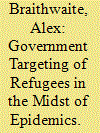

|
|
|
|
|
| Summary/Abstract |
We investigate how the outbreak of epidemics can affect host governments’ targeting of refugees and violation of their physical integrity rights. We argue that governments target repression against refugees for two reasons. First, refugees are easily scapegoated for the arrival of epidemics at a time when governments are looking to shift the blame for their own poor performance. Second, crises provide circumstances for governments to engage in opportunistic repression to further their goal of coercing existing refugees to depart and deterring new refugees from arriving. Drawing upon a global dataset of countries for the years 1996 to 2015, we demonstrate that epidemic outbreaks do indeed increase the likelihood and scale of government repression targeting refugee populations. These effects are especially pronounced in countries with higher proportions of refugees hosted and in less democratic countries. Identification of this potential for government repression of refugees during epidemics is important in light of the grave scale of the ongoing COVID-19 pandemic. Our findings suggest the international community should be vigilant for signs of governments’ mistreatment of vulnerable refugee populations to shift focus away from their own poor handling of crises such as the ongoing COVID-19 pandemic and opportunistically advance their goal of reducing the numbers of refugees hosted locally.
|
|
|
|
|
|
|
|
|
|
|
|
|
|
|
|
| 10 |
ID:
093605
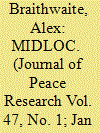

|
|
|
| 11 |
ID:
164551
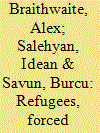

|
|
|
|
|
| Summary/Abstract |
Few issues in international politics have dominated public debates, both in domestic and international arenas, as much as refugee movements across borders in recent years. By the end of 2017, more than 68.5 million people – one in approximately every 110 people on the planet – had been displaced from their homes, either as internally displaced persons (IDPs) or as refugees, due to violent conflict, persecution, famine, or natural disasters. This article introduces a special issue on refugees, forced migration, and conflict. It describes the evolution of the international refugee regime and identifies theoretical and methodological advances in the relevant literature. It concludes with a discussion of the individual contributions to the issue, which seek to address gaps in the literature with respect to explaining motivations for refugee departures, understanding the relationship between refugee populations and political instability in host countries, and tracking public attitudes towards hosting refugee populations.
|
|
|
|
|
|
|
|
|
|
|
|
|
|
|
|
| 12 |
ID:
097769


|
|
|
|
|
| Publication |
2010.
|
| Summary/Abstract |
The collapse of Mobutu's Zaire and the arrival of father and son Kabila regimes in the Democratic Republic of the Congo (hereafter, the DRC) were hastened by the dramatic and tumultuous spread of violence from neighboring Rwanda. Mobutu's state's inability to manage the influx of Hutu refugees (with Interahamwe militia members interspersed) into the Kivu province of eastern Zaire from Rwanda's bloody genocide of 1994 or to compensate for the ratcheting up of their cross-border skirmishes with the Banyamulenge (Zairean Tutsi) population in 1996, exacerbated extant tensions and has since resulted in more than a dozen years of civil war. This example prompts us to ask: are countries with higher levels of state capacity better able to resist the spread of violence from neighboring territories into their own? The author argues that when falsely divided notions of spatial heterogeneity and dependence are interacted, contagion from neighboring conflicts becomes a risk of diminishing value for increasingly capable states. A model of civil war contagion affirms a conditional hypothesis, showing that state capacity modifies the likelihood that a state will become infected by a civil conflict occurring in neighboring territories.
|
|
|
|
|
|
|
|
|
|
|
|
|
|
|
|
| 13 |
ID:
175737
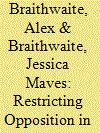

|
|
|
|
|
| Summary/Abstract |
We offer a novel argument to explain how the use of terrorist violence is affected by the restrictions that governments place on opposition participation in elections. Opposition actors often decide whether and how to participate in elections. Governments influence these decisions by controlling who can contest elections and, by doing so, they influence the access to public support that opponents stand to gain from participating or fighting. “Unrestricted” elections, without limits on who can participate in opposition to the government, represent an opportunity for moderation in politics. This moderation threatens the raison d’être of violent extremists. Accordingly, extremists are likely to look to use violence to spoil unrestricted elections. “Restricted” elections, where some opponents are excluded from participating, undermine public support to the opposition as a whole, thereby reducing the likelihood that they are able to resort to terrorism. Importantly, these effects are anticipated to be most prevalent in non-democracies, where norms of moderation in politics are yet to be fully developed. A series of negative binomial regression models provide support for these dual logics.
|
|
|
|
|
|
|
|
|
|
|
|
|
|
|
|
| 14 |
ID:
140404
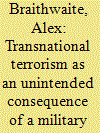

|
|
|
|
|
| Summary/Abstract |
Terrorist groups commonly cite the local presence of foreign troops as a motivation for their violence. This article examines the validity and robustness of the proposition that the deployment of military capabilities overseas provokes terrorist violence against the deploying state's global interests. A cross-national dataset, combining data on foreign troop deployments and transnational terrorist violence directed against states' global interests, is used to create a series of empirical models at the directed-dyad-year level of analysis. Descriptive statistics and multivariate analyses provide corroborative evidence of territorial terrorism. These findings are robust to a wide variety of alternative specifications and to the use of instrumental variables regression to model the potential endogeneity of terrorism to troop deployment decisions.
|
|
|
|
|
|
|
|
|
|
|
|
|
|
|
|
| 15 |
ID:
186324


|
|
|
|
|
| Summary/Abstract |
States around the world are fortifying their international borders at unprecedented rates. While only seven states had fortified their borders with walls or fences as of the end of World War Two, this number has now grown to more than 75. Why do states build walls on their international borders? While states may build walls to ameliorate the consequences of cross-border economic inequalities and to defend against transnational security threats, we suggest that another compelling logic stems from domestic politics and leaders’ desire to remain in office. Building on assumptions furnished by diversionary theory, we argue that national political leaders at risk of losing office are incentivized to implement popular policies, such as border wall construction, hoping that doing so will prompt a domestic rally effect. To test this argument, we assemble a global dataset of leader-years and find that politically insecure leaders are more likely to be seen to start and continue border wall construction.
|
|
|
|
|
|
|
|
|
|
|
|
|
|
|
|
|
|
|
|
|